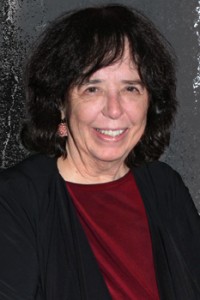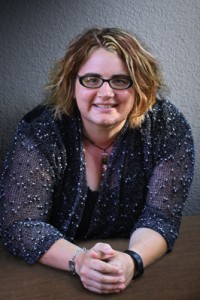R.S.A. Garcia: Main Character Energy

RHONDA S.A. GARCIA was born in Trinidad and Tobago, where she has lived her entire life. Though she earned her A levels and qualified to enter university, her mother’s illness and other difficulties made it impossible for her to attend. She worked various jobs, most recently as an administrator in the engineering industry, until becoming a full-time writer following a breast cancer diagnosis in 2021.
Garcia began publishing SF with ‘‘Douen Mother’’ (2006, as R.S. Garcia), and has produced more than a dozen stories so far in publications including Uncanny, The Sunday Morning Transport, and Clarkesworld. Notable short works include Ignyte Award and Sturgeon Memorial Award finalist ‘‘Philia, Eros, Storge, Agápe, Pragma’’ (2021); Ignyte and Nebula Award finalist ‘‘Bishop’s Opening’’ (2022); and Nebula Award winner ‘‘Tantie Merle and the Farmhand 4200’’ (2023), also a Eugie Award, Sturgeon Memorial Award, and Ignyte Award nominee. Fantasy novella The Unbearable Taste of Fruit and Wine is forthcoming.
Her debut novel Lex Talonis (2014) is a science fiction mystery. Her new novel is science fantasy The Nightward, out in October 2024, first in the Waters of Lethe duology.
Garcia won the Machine Intelligence Foundation for Rights and Ethics 2023 Media Award. She lives in Trinidad and Tobago with her extended family.
Excerpt from the interview:
“I started writing the book that would become Lex Talionis when I was in secondary school, just after I read It. Stephen King blew my mind in that book with the power of capturing youth and the dark parts of childhood. I did not have an easy life – my childhood had a lot of things in it that were terrifying and kids should not have to endure. My mom had difficult marriages, there was a lot of abuse, you know? When I read It, and I saw Beverly Marsh’s life, I understood the mindset, and I understood what was happening – to a certain extent. Just this idea that this was happening to these kids, I clicked immediately with that: ‘Oh, yeah. As kids, horrible things happen to you, but you can live through it.’ That book rescued me from one of the hardest periods of my life.
“At that time, my mom wasn’t with me anymore – she was so sick that I was separated from her, and we were trying to get my sister. I was separated from my home for a while, and then I went back to be with my grandmother. I was in the middle of this separation, missing my sister, not sure where my mom and my sister were, and I read this book and I understood what it was to be alone in this horrible, dark period, when nobody understands what you’re going through, and you can’t really talk about it with anyone because it’s too horrible. How many people are really going to listen to you? Most people don’t want to hear about bad things. It felt like it was me and my grandmother against the world. When I finished that book, I cried. I really, really cried. And I read it over again, immediately, and I cried again. So I’ve been a Stephen King fan for a long time.
“After I read that, I encountered Nalo’s Midnight Robber. I had decided I was going to write fiction, and I was going to write it like Stephen King, because I wanted to write for a living. I wasn’t sure how I was going to do it, because nobody writes for a living in my country. If you write, you either have multiple jobs or you’re a journalist – those are your options. You can write, but you have to do something else too. Only journalism pays, and journalism pay sucks; we all know that. So when I went into it, I thought, ‘Maybe the only way to do this is to get really rich, so I can take care of my mom and my sister and everything.’ I was definitely going to write the stuff I like, commercial genres, because that was really popular.
“But I didn’t know how I was going to approach it, because, to me, everything I’d ever read that people really liked was about white people. It was mostly white people in sci-fi and fairy tales and fantasy. I didn’t read a ton of those, even though I was fully invested in all of this mythology from India and from Africa and I knew about Anansi and Br’er Rabbit, all these witches and gods and everything. It was still separate to me – that is the power of colonialism. It still was a separate thing from how you make money in the world. I had absorbed the lesson that white society was the default, and if you wanted to make money, you had to sell to them. Even though I lived in a world made up of only people of color, and my president was Black and my PM was Black and everybody else was Black and Brown, I still had the idea that the reading public was white.
“At that point in time, discovering Midnight Robber, which had West Indian people in this very specific sci-fi setting, blew my mind with how far ahead it was, compared to the Asimovs and the Heinleins I’d been reading. I was like, ‘Wait a minute – not only is this real sci-fi, but it’s me! This is me!’ Also because the girl in this book, Tan-Tan, is going through something dark, and awful, and it’s at the hands of her parents, who are supposed to protect her. Even though I didn’t go through that same sort of situation at the hands of my parents, the situation itself and having to deal with this horrible thing when you’re young, being in danger and not being safe, and not being able to advocate for yourself or feel protected – those were things I was intimately familiar with. I understood as soon as I read it that Nalo understood, as well. That’s a plague that Black women in the West Indies face. I mean, women everywhere face it: domestic violence, assault, mistreatment from loved ones. It’s something that all of us face, and it’s a scourge, for us, because of how our family was deliberately broken.
“But when I read Midnight Robber, I also read the joy, and the resilience, and the love that Granny had for her missing charge in this story, and I related to that hella hard, too. I said to myself, ‘Right, so I can be myself writing this.’ It still took me a lot of years to figure out how to be myself in my writing, but that was basically what brought me to it.
“The Nightward actually rescued me, again, from a period of mourning. My grandmother passed away right after I published my first book, and I couldn’t write anything for years. I was really devastated; she was one of my supporters. I started experimenting with short stories, at first, and then my sister told me, ‘Why don’t you just write something that’s been sitting in your head that’s fun?’ I thought, ‘You know what, I’ve had this idea in my head for the longest while, because I don’t see princesses that are mixed race. There are so many princesses that have lovely blonde hair….’ I, myself, am of mixed race – ‘Black culturally’ is how I describe it, because in Trinidad you can be of mixed race and grow up in a specific ethnicity. I have a lot of Black friends who were raised Indian, culturally, because Mom was Indian. There are a lot of people like me.
“I would see these lovely fantasy stories, these epic fantasy stories, and it was always about a lovely blond farm boy who figures out he’s the king’s son. Or this nice boy that’s been left somewhere with some relatives he doesn’t really like, who figures out he’s the savior’s son. I was like, ‘Huh.’ I’d seen Alien at some point, and that was the first time I saw a woman in an action movie who was the hero. I freaking love that movie – I love every single one of the movies in the franchise. You can debate the quality as much as you like, but there’s no Alien movie I didn’t love. I’m perfectly willing to say some are better than others. Sigourney Weaver was not the big name in that movie, but she’s the one that comes to the front, after she spent the whole beginning of the movie being hated on by everyone else for essentially being right.
“It was her portrayal, too, that got me. The freaking nonsense where a girl tells you this is a bad idea and you should stick to policy, and you override her because you’re emotional and she’s not. If they’d listened to Sigourney Weaver, that alien would have never gotten on board.
“I saw that movie, and I thought, ‘Girls can do this, too.’ I wrote things that were inspired by that and a lot of other stuff, including Ice Pirates, this weird ‘80s TV film, and I wanted to keep doing that sort of thing, but this time I wanted to do it with epic fantasy. I thought back to Nalo, and how she made that sci-fi world live and breathe with these cultural touchstones from my world. I wondered if I could do that for epic fantasy. If I could write an epic fantasy with cultural touchstones specifically from my people. I only finished writing it because my sister gave me a deadline, and I hate missing deadlines. She said, ‘We’re going to send this to a publisher’s open submission period,’ and I was like, ‘No, it will be a mess!’ She said, ‘Just work with the deadline.’ So I worked with the deadline, and, of course, the book was a mess, and, of course, the publisher rejected it – as they should. It wasn’t ready.
“But I had a finished product, and I was able to work on it, and see what the story really wanted to be. I was understanding that, for me, there are a lot of touchstones with our culture. Our society has faced a lot of dark things, and our history has a lot of darkness, but our people and our culture are not like that. We have taken as much joy and empowerment as we can, as we try to move into the future. We are not perfect, we make mistakes, and we have societal ills: There is a lot of crime, and there is poverty, but these are the same things every society struggles with, is how I look at it.
Interview design by Francesca Myman
Read the full interview in the October 2024 issue of Locus.
 While you are here, please take a moment to support Locus with a one-time or recurring donation. We rely on reader donations to keep the magazine and site going, and would like to keep the site paywall free, but WE NEED YOUR FINANCIAL SUPPORT to continue quality coverage of the science fiction and fantasy field.
While you are here, please take a moment to support Locus with a one-time or recurring donation. We rely on reader donations to keep the magazine and site going, and would like to keep the site paywall free, but WE NEED YOUR FINANCIAL SUPPORT to continue quality coverage of the science fiction and fantasy field.
©Locus Magazine. Copyrighted material may not be republished without permission of LSFF.






